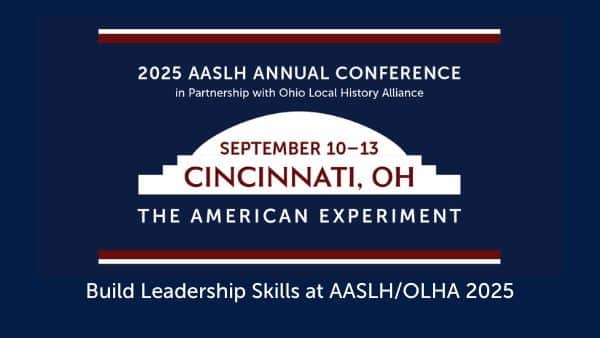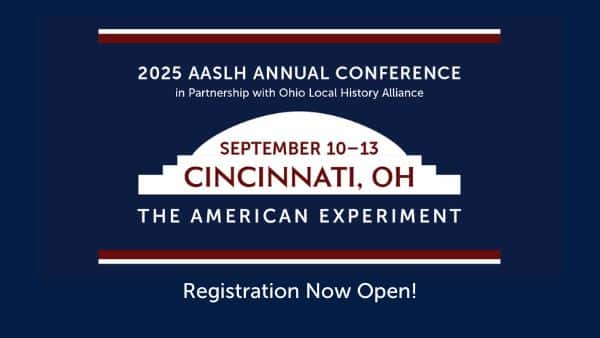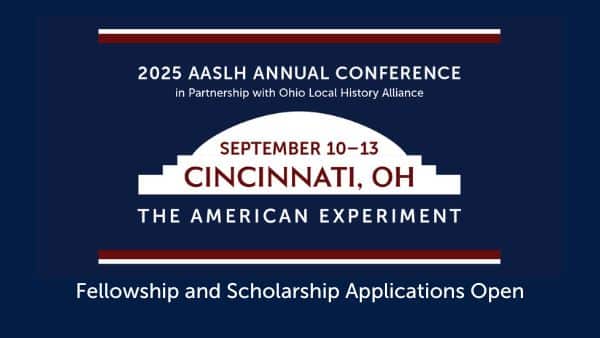
Caitlin Williams was awarded a Small Museums Scholarship to attend the 2016 AASLH/MMA Annual Meeting. You can learn more about the AASLH Small Museums Scholarships here.
The drive to greater downtown Detroit from Metro airport was as somber as the weather that day. Through rain streaked windows, I listened to a story–the kind we museum people are attuned to–told in the voice of inanimate objects. I’ve heard stories like this before-stories illustrated by a series neglected lots, crumbling infrastructure, and apparent inactivity. The ones about Post-Industrial America and the looming loss of promise. I was surprised by my discouragement because I knew the history, yet each boarded window and door set moods of uncertainty and defeat. In a matter of minutes I developed an attitude towards Detroit; it was a get-the-heck-out kind of feeling.
It’s easy to look only at problems and there’s no shame in that; it’s a survival instinct. Hmmm…That place doesn’t appear to be abundant in resources, much less safe, so let’s avoid it. It’s simple logic that applies to our daily lives in our relationships, our homes and in our work places. In small museums, problems at times can overwhelm us to the point where we may question our choice in career. Whether it be budget cuts, short staffing, reoccurring mechanical failures or a wedding gown collection that takes up a disproportionate amount of storage space – you need to find a way for your institution to survive. But if we’ve learned anything from Darwin, survival of the fittest isn’t about being the strongest or most intelligent, it’s about being the most adaptable. And in our field, we’re the best there is at that.

Early morning yoga at the 2016 AASLH/MMA Annual Meeting.
“Whether you think you can or can’t, you’re right.” – Henry Ford
The way we perceive the world around us affects the ways we navigate within those spaces. Attitude is everything. So while our lists of issues never go away, we can monitor our attitudes about them, reaching our greatest potential when we create and operate in a state of self-empowerment, not self-defeat. The best way to adapt is to re-imagine our circumstances.
Mental flexibility requires letting go of our rigid desires to control undesirable situations. Of course that isn’t as easy as it sounds. You need to consciously stretch your perceptions and emotions when you encounter unfavorable situations. Persevere as you challenge negativity that you’ve either fixated on, or pushed to the outskirts of your mind. Practice seeing things in a new light; not only will it better equip you with the mental and emotional tools to take on challenges and choose a course of action, it will also create a healthier work environment for your co-workers.

The author in Detroit with Canada in the background
“2+2=8. Create your own reality.” – Tyree Guyton of the Heidelberg Project, Detroit.
It’s a privilege to be one of many institutions transforming our communities, and in small museums, that great responsibility falls on a few. Self-care, beginning with introspection, is vital to our work because how we are correlates to how our institutions are perceived. We must commit to practicing methods of self-care, be it internal dialogue, setting boundaries, humor, exercise, or not eating lunch at our desks–while remembering that we are the vessels carrying out resolutions to help small museums survive, and even thrive.
Rather than accept defeat, the city of Detroit is re-imagining itself by promoting positive attitudes and uncovering opportunities that emerge out of challenging circumstances. What a wonderful place to attend the AASLH annual meeting! I’m thankful for the opportunity to share with colleagues transformational ideas in a city that exudes the very attitude needed to make successful, positive and long lasting change in the museum field.

A Detroit cathedral, visited during an Annual Meeting tour.



